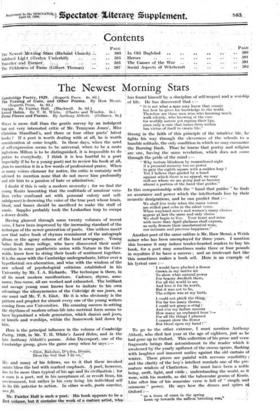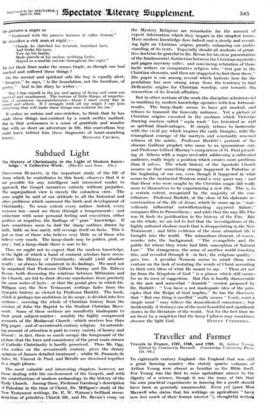The Newest Morning Stars
WilAr is more dull than the gentle survey by an indulgent but not very interested critic of Mr. Tennyson Jones', Miss
Christina Standbad's, and three or four other poets' latest books ? If a poet is worth dealing with at all, he is worth consideration at some length. In these days; when the need of self-expression seems to be universal, when to be a mute inglorious Milton is to be distinguished, it is impossible to do justice to everybody, I think it is less hurtful to a poet
(especially if he be a yoUng poet) not to review his book at all, than to mention it in a few words of professional praise. When so many voices clamour for notice, the critic is certainly well
advised to mention none that do not move him profoundly and stir hini to a passion-of hate or adMiration: - I doubt if this is only a modern necessity ; for we find the young Keats lamenting that the multitude of amateur vers- ifiers (who- Confound art with personal outcry and self- indulgence) is drowning the voice of the true poet whose brain, blood, and' bOnet should be sacrificed to make the stuff of music. Sappho probably took the Leukadian leap to escape a slower death.
Having glanced through some twenty volumes of recent
verse, I have been impressed by the increasing standard of the technique of the newer generation'of -poets. One seldom meets now that naive book of rhymes reminiscent of the autograph album or.theagony column of the local newspaper. Young ladies fresh from college, who have discovered their souls' vocation in some. pantheistic union with Nature in the Cots- wolds, know how to string their beads of sentiment together.
his the same with the Cambridge undergraduate, bitter over a hypothetical sex-aberration, and wise with the wisdom of the new school of psychologiCal criticism established in his University by Mr. I. A. Richards. The technique is there, in all its most modern ramifications. Cadence, rhyme, asso- nance, free-verse, all are worked and exhausted. The brilliant and savage young man knows how to imitate to -his own advantage the idiosyncrasies of the Coleridge de 1508 jours, as
one must 'calf Mr. T. S. Eliot. He -it is who obviously is the pattern and prophet for almost every one of the young writers coming from our Universities. His amazing success in setting the rhythms of modern urban life into metrical form seems to have hypnotized a whole generation, which clinceS and jeers, or kneels and worships, within the framework laid down by him.
Here is the principal influence in the volume of Cambridge Poetry, 1929, in Mr. T. H. White's Loved Helen, and in the
late Anthony Abbott's poems. John Davenport, one of the ; Cambridge group, gives the game away when he says :— .. . .
" Ratelais, Dryden, Donne,
Bless the bed that I lie on,"
• • : He, and many of his fellows, see to it that these invoked saints bless the bed with marked emphasis. A poet, however, has to be more than typical of his age and•its civilization; for a man is a poet, not in his acceptance of, or revolt from, his environment, but rather in his very being, his individual self in its life anterior to action. In other words, poeta naseitur, non fit.
Mr. Fair. fax Hall is" such- wpoet: • His book appears to be a • first volume, but it contains the work of a mature artist, who
has found himself by a discipline of self-respect and a worship of life. He has discovered that :-
" It is not what a man may know that counts but how he gives his knowledge to the world. •
Therefore are these men wise who knowing much walk silently, who knowing of the cure for worldly sorrow yet repress their lips, since only a cure that issues from within has virtue of itself to create life."
Strong in the faith of this principle of the intuitive life, he
When wayward men's and women's many choices appear at last the same and only choice We shall begin to live. Your heart and mine with more than April gladness shall express, as early flowers their unsubstantial wine, our intimate and precious happiness." .
Another poet of the same calibre is Mr. Huw Menai, a Welsh miner who has been unemployed for three years. I mention this because it may induce tender-hearted readers to buy his book, for a poet may sometimes make three or four pobnds in royalties if he have a success ; and an irrelevant fact like 'this sometimes makes a book sell. Here is an example of his lyrical ease :—
" I would have plucked a flower
Grown in my native air To show what natural power For beauty dwelleth there,
For all the world to see
And love it for its worth, But it was not to be, The eclipse was at my birth.
I could not pluck the Mit, - For far too many thorns, - I could not grasp a stria And o'er my failure mourns. How many an orphaned hour ?- For all the things I planned I cannot show the flower But blood upon my hand ! "
To go to the other extreme, I must mention Anthony Abbott, who died last year at the age of eighteen, just as he had gone up to Oxford. This colleetiOlf of his prose-And-verse fragments brings that astonishment to the reader which is awakened by the yearly upthrust of the crocus spears, flashing With laughter and innocent malice against the old curtain of winter. These pieces are painful with nervous sensibility ; and the clarity of the boy's intellect reminds one of the pre- mature wisdom of Chatterton. He must haVe been a noble being, swift, light, and virile ; understanding the world, as it were, with his nostrils, as did the tubercular genius of Keats. Line after line of his muscular verse is full of " simple and sensuous " power. He says how the domes and spires of
Oxford :-
" as a team of roses in the spring Lean up towards the saffron brooding sun." fights his way through the cleverness of the schools to a humble solitude, the only condition in which we may encounter the Burning Bush.- Thus' he learns' that poetry and religion
are one, having the same revelation, which does not come through the pride of the mind
" Why torture blindness by remembered sight
if a prenatal memory has no power to gain the eighth square with a sudden leap ?
Yet I believe that guided by a hand against which there is no appeal, we may still see where we are going and so become
almost a portion of the hand that guides." . ,
In this companionship with the " hind that guides " he finds an assurance and power which the intellechials lose by their
neurotic denigrations, and he can predict that :—
We shall live truly when the many voices are stilled past echo in the silent voice.
Ile pictures a negro as " Fashioned with the passive laziness of coffee flowers:' Ile describes a sick man at night :- " Closely he clutched his feverish, famished hair, And broke his eyes, Tore up his hands; Made parcels of his useless, writhing limbs, Stayed as a marble suicide throughout the night."
Do not these lines make the senses tingle, as though one had touched and suffered these things ?
On the mental and spiritual side the boy is equally alert. Imagery," he says, " is the foundation, not the furniture, of poetry." And in his diary he writes :—
- May I lose myself in the joy and agony of living and come out mystical and unashamed. The torture of little things, of imperfec- tion, of grossness, incomprehension—these I meet every day in myself and others. If I struggle with all my might I can gain everything that will make these things non-existent for me."
It makes us serious and awe-stricken, to think that he has made these things non-existent by a much swifter method.
But in that seriousness is a sense of gratitude and wonder that with so short an adventure in life, this marvellous boy could leave behind him these fragments of heart-searching



















































 Previous page
Previous page